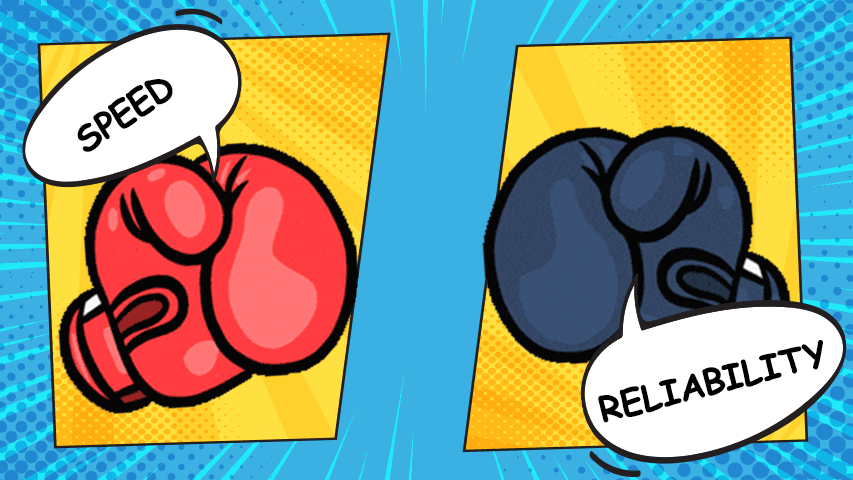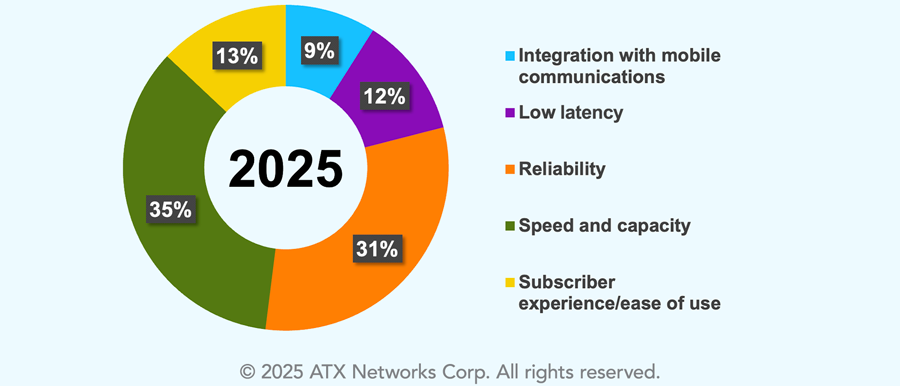Blog
April 30, 2025
MSOs Now See Speed & Reliability as Knockout Combination
By Joe McGarvey, Marketing Director |

“Speed’s what we need. We need greasy, fast speed.”
Those words of wisdom delivered by trainer Mickey Goldmill at the beginning of Rocky II have pretty much been the mantra for broadband service providers for the past several decades, MSOs included. The “G” in CableLabs’ 10G initiative, after all, is short for gigabits per second.
In recent months, though, MSOs’ obsession with speed — greasy or otherwise — has expanded to include reliability, which is dominating more and more of the conversation about where cable operators are placing priority. When asked what attribute subscribers crave the most at trade shows and other industry events, including last month’s Cable Next-Gen Technologies and Strategies, cable executives and technologists are almost always leading with reliability.
Given the industry’s long-time fixation, bordering on addiction, with speed, it’s worth asking if all the recent talk about reliability isn’t just a case of saying the right thing, or if the cable industry is earnestly responding to growing threats to its broadband market dominance by broadening its priorities to include subscriber satisfaction.
In other words: Are MSOs really elevating reliability to the top of the service menu, next to speed and bandwidth?
Seems so.
And here’s why.
For starters, raw speed is no longer a competitive advantage, as it was before telecom operators started overbuilding their copper plants with fiber. The current competitive situation is essentially a speed stalemate. Yes, some FTTH providers are pushing 5-10 Gigabit per second symmetrical residential services. But given that few if any subscribers are even coming close to requiring those kinds of download or, especially, upload, speeds, the current advantage for FTTH over MSOs on the speed front is essentially theoretical.
Will subscribers eventually require broadband services that exceed 10G? Count on it. But by the time applications pushing current broadband speed limits hit the mainstream, MSOs will have either upgraded their coaxial connections to 3GHz or faster or will have replaced their coax plants with fiber.
Walking the Talk
The good news is that cable operators appear to be walking the talk when it comes to improving operational efficiency and the reliability of their networks. The sincerity of that shift is validated, for example, by recent investment in intelligent outside plant equipment.
Much has been written about so-called smart amps, nodes and other equipment capable of helping to streamline MSOs’ ability to install, upgrade and troubleshoot actives in their networks. But that’s just the beginning. Equipping amplifiers with two-way transponders that can remotely deliver a wellspring of network health information is critical to improving overall reliability and customer satisfaction.
Fixing network issues before they impact subscribers and remedying network disruptions in a fraction of the time it used to take translate into fewer service calls and service interruptions. MSOs now recognize that adding intelligence to their infrastructures is intrinsically linked to network reliability.
Network Smarts
They also recognize that strengthening and automating customer care and network operations through the adoption and integration of powerful artificial intelligence (AI) and machine learning (ML) engines are equally vital to upping network reliability. MSOs, according to published reports, are also increasingly leveraging AI and ML.
Perhaps the most convincing evidence that MSOs are serious about customer satisfaction and network reliability can be found in the results of ATX’s most recent HFC evolution survey — the 2050 Project Survey. Earlier this year, the survey asked cable professionals to identify the broadband attribute likely to have the biggest impact on subscriber adoption in the future. Roughly a third (31%) selected Reliability.
With DOCSIS 4.0 essentially enabling MSOs to offer similar speeds and capacities as FTTH providers, please select the broadband service attribute that will have the biggest impact on subscriber selection in the future.

While that response trailed Speed and capacity by a few percentage points, a closer look at the results suggest that a majority of respondents likely had reliability on their minds. Given that 13% selected Subscriber Experience, 12% opted for Low latency and another 9% picked Integration with mobile communications — all options suggestive of network reliability or end-user convenience — MSOs, at least the ones completing the annual survey, appear to no longer view speed as the be-all and end-all of customer experience.
The bottom line is that MSOs are serious about improving the reliability of their networks to retain and attract current and future subscribers. And why wouldn’t they be?
MSOs are on a path to completely transition their HFC networks to fiber. That’s a fact, as well as the premise of ATX’s 2050 Project, which is dedicated to charting MSOs’ gradual and economically prudent HFC-to-FTTH transition of their networks.
Still Standing
When that transition is mostly completed, circa 2050 being the rough target date, any transport technology distinctions between MSOs and FTTH players will be eliminated, rendering speed differential a meaningless comparison point. When that happens, service providers offering superior reliability and customer experience, regardless of transport medium, will be the ones left standing.
That’s why the new emphasis on reliability is so important. By turning their attention to reliability now, MSOs will soon be in a great position to defend the heavyweight broadband title they’ve held for the past couple of decades.
But why not leave it to the fictional and poetically gifted Goldmill to sum up why MSOs, with the proper focus and execution, will ultimately outlast their broadband competition?
“Like the guy says, you’re gonna eat lightning and you’re gonna crap thunder.”


